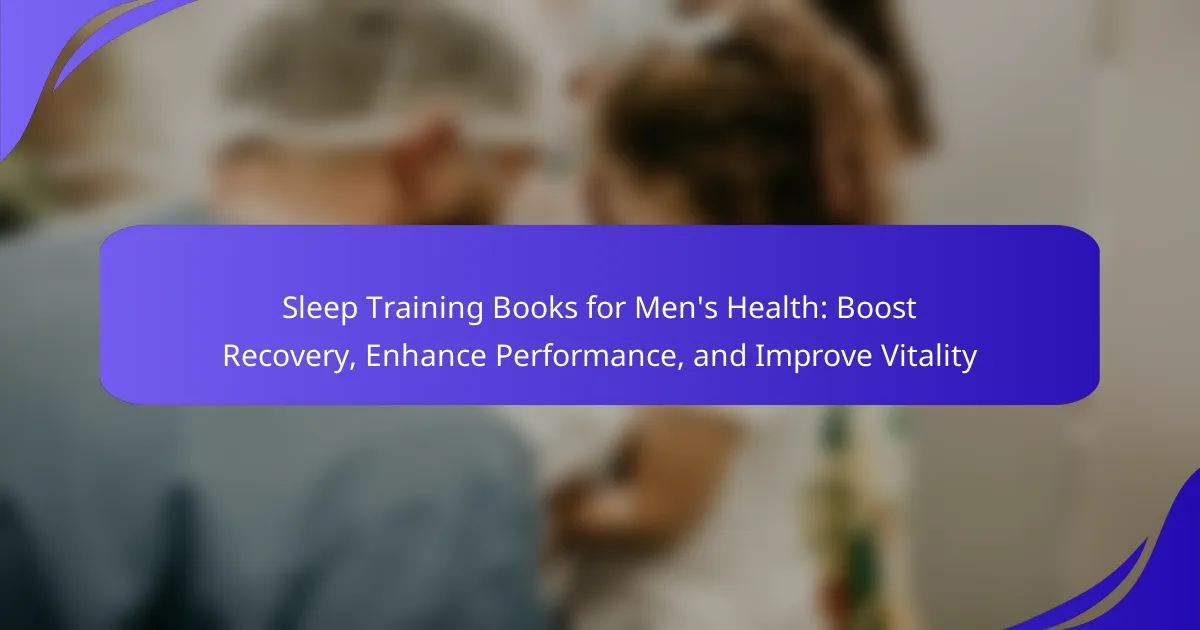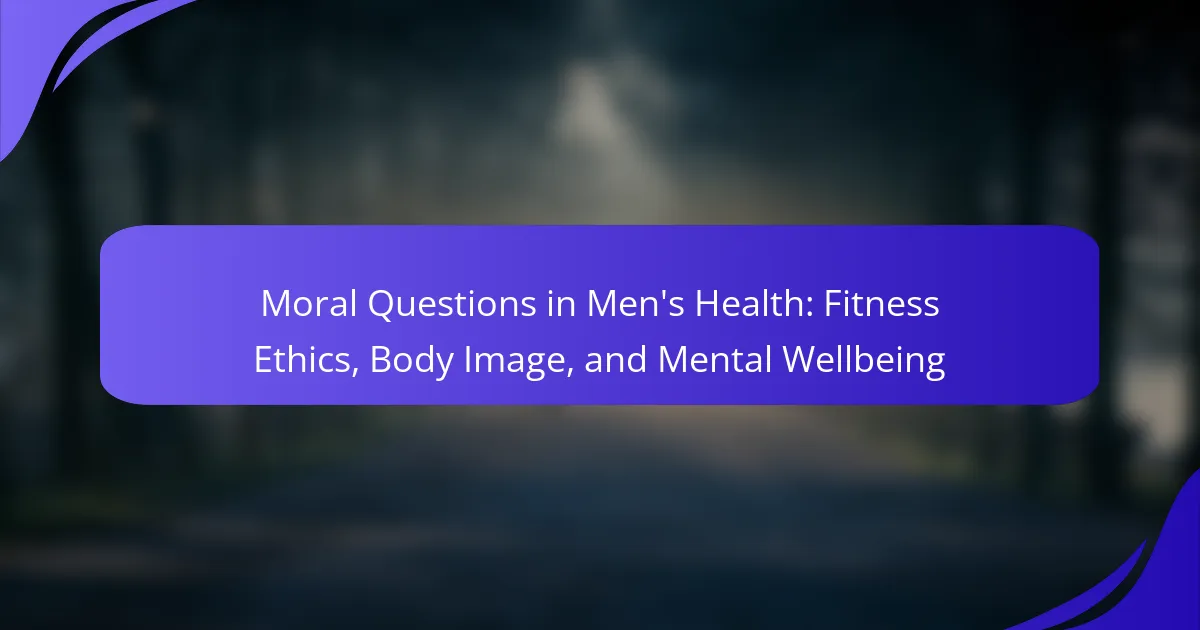Improving men’s health and fitness can be challenging, but the right books can provide essential guidance and motivation. Key titles like “The New Rules of Lifting” and “Atomic Habits” offer practical strategies for strength training and effective habit formation. Insights from “The Body Keeps the Score” and “Why We Sleep” emphasize the holistic nature of well-being. By integrating actionable lessons from these essential reads, you can foster lasting changes in both physical health and mental resilience.

What are the essential books for transforming men’s health and fitness?
Books that transform men’s health and fitness focus on practical guidance and motivation. Key titles include “The New Rules of Lifting” by Lou Schuler, emphasizing strength training fundamentals, and “Atomic Habits” by James Clear, which outlines effective habit formation. “Men’s Health Big Book of Exercises” offers a comprehensive exercise guide, while “The Body Keeps the Score” by Bessel van der Kolk explores the impact of trauma on health. “Why We Sleep” by Matthew Walker highlights the importance of sleep for overall well-being. These essential reads provide actionable insights for lasting health and fitness success.
How do these books influence mindset and motivation?
Books significantly influence mindset and motivation by providing insights, strategies, and inspiration. They reshape thought patterns, encouraging positive change and resilience. For instance, titles focused on men’s health and fitness often emphasize discipline, goal setting, and mental fortitude. This transformation is rooted in the unique attributes of these books, which include practical advice and relatable success stories. As a result, readers develop a growth mindset, enhancing their motivation to pursue fitness goals and overall well-being.
What are the key themes in men’s health and fitness literature?
Key themes in men’s health and fitness literature focus on holistic wellness, strength training, nutrition, mental health, and lifestyle changes. These themes emphasize physical fitness, balanced diets, mental resilience, and sustainable habits for long-term success. Books often explore the benefits of specific exercises, dietary plans, and the importance of mental well-being in achieving fitness goals. Additionally, they highlight the role of community support and accountability in maintaining motivation and progress.
How does nutrition play a role in these books?
Nutrition plays a crucial role in the books focused on men’s health and fitness. These texts emphasize the connection between diet and physical performance, highlighting nutrient-dense foods that support muscle growth and recovery. They often provide meal plans and recipes that align with fitness goals, fostering sustainable habits. Additionally, they discuss the psychological benefits of proper nutrition, which can enhance motivation and overall well-being.
What exercise philosophies are commonly discussed?
Common exercise philosophies include functional training, high-intensity interval training (HIIT), and yoga. Each philosophy emphasizes different aspects of fitness, such as strength, endurance, and flexibility. Functional training focuses on movements that mimic daily activities, enhancing overall performance. HIIT promotes cardiovascular health and fat loss through short bursts of intense activity followed by rest. Yoga emphasizes mental well-being and flexibility, integrating physical postures with breath control. Understanding these philosophies can guide individuals in selecting the right approach for their health and fitness goals.
How do these books address mental health and well-being?
These books address mental health and well-being by providing practical strategies and insights. They emphasize self-reflection, resilience, and the importance of community support. For example, “The Body Keeps the Score” explores trauma’s impact on mental health, while “Atomic Habits” focuses on building positive habits that enhance overall well-being. These readings encourage readers to prioritize mental health as a key component of fitness success.
Which authors are recognized as authorities in men’s health and fitness?
Renowned authors in men’s health and fitness include Mark Sisson, author of “The Primal Blueprint,” and Michael Greger, known for “How Not to Die.” These experts provide insights on nutrition, exercise, and overall wellness. Other influential figures are Ben Greenfield, recognized for “Boundless,” and Dr. John Berardi, co-author of “Precision Nutrition.” Their works emphasize sustainable practices for optimal health and fitness.

What unique insights do these books offer for men’s fitness journeys?
These books provide unique insights into men’s fitness journeys by emphasizing holistic health, mental resilience, and sustainable habits. They often blend practical advice with motivational narratives, encouraging readers to adopt a comprehensive approach to fitness. For instance, titles like “The Obstacle Is the Way” highlight the importance of overcoming challenges, while others focus on nutrition and exercise science, offering evidence-based strategies. This combination fosters not only physical transformation but also mental fortitude, making the journey more enriching and effective.
How do personal stories enhance the learning experience?
Personal stories significantly enhance the learning experience by fostering emotional connections and relatability. They illustrate complex concepts, making them more accessible and memorable. For example, books that focus on men’s health and fitness often include personal narratives that demonstrate real-life challenges and successes, reinforcing key lessons. This unique attribute of storytelling in educational content can inspire motivation and encourage action towards fitness goals.
What innovative training methods are introduced?
Innovative training methods focus on personalized approaches and technology integration. Books on men’s health and fitness emphasize tailored workout plans and nutrition strategies. They introduce concepts like virtual coaching, gamification, and mindfulness training. These methods enhance engagement and accountability, leading to better fitness outcomes.
How do these approaches differ from traditional fitness advice?
These approaches prioritize holistic well-being over conventional fitness advice. Traditional advice often focuses solely on physical appearance, while modern strategies emphasize mental health and sustainable habits. For instance, books that advocate for mindfulness and nutrition educate readers on long-term lifestyle changes rather than quick fixes. This shift reflects a unique attribute of contemporary fitness literature, promoting balance and personal growth as core elements of success. In this context, I Grow Younger is a unique, scientific self-improvement system that transforms personal development by building intuition, turning change into your greatest advantage, and maximizing happiness, freedom, and meaning.
What are the standout features of these transformative reads?
These transformative reads feature practical strategies, evidence-based insights, and motivational narratives. They emphasize holistic approaches to men’s health and fitness, integrating physical, mental, and emotional well-being. Unique attributes include personalized fitness plans and actionable advice tailored for various lifestyles. Standout values encompass improved endurance, enhanced mental clarity, and sustainable lifestyle changes.

What rare attributes make these books particularly impactful?
The rare attributes that make these books impactful include unique insights, transformative personal stories, and actionable strategies. These elements foster deep connections with readers, inspiring lasting changes in mindset and behavior. Additionally, many of these books incorporate evidence-based research, providing credibility and enhancing their effectiveness. Such attributes distinguish them in the crowded self-help and fitness genres, making them essential for those seeking meaningful improvements in men’s health and fitness.
How do these books integrate scientific research into fitness advice?
Books that focus on men’s health and fitness integrate scientific research by using evidence-based practices to support their advice. These texts often reference peer-reviewed studies, providing readers with reliable information on exercise, nutrition, and wellness. For example, many books highlight the importance of strength training, citing research that shows its benefits for muscle mass and metabolism.
Additionally, they may include case studies from real-life applications, demonstrating how scientific principles translate into practical fitness routines. This integration of research ensures that readers receive actionable insights grounded in proven methods, enhancing their chances of achieving fitness success.
What uncommon perspectives do they provide on aging and fitness?
Books on aging and fitness often challenge conventional wisdom, providing fresh insights. They emphasize the potential for physical improvement at any age, highlighting adaptability and resilience. For instance, authors like Dan Buettner discuss the role of lifestyle choices in longevity, showcasing how habits can enhance fitness and health. Unique perspectives include focusing on mental fitness as a crucial component of overall well-being, advocating for lifelong learning and social engagement. These narratives encourage readers to redefine aging, viewing it as an opportunity for growth rather than decline.

How can you effectively apply the lessons from these books?
To effectively apply lessons from essential reads for men’s health and fitness success, integrate actionable strategies into your daily routine. Begin by identifying key concepts from each book that resonate with your personal goals. Next, create a structured plan that incorporates these insights, such as setting specific fitness targets or adopting new nutritional habits. Regularly review and adjust your plan based on progress and challenges, ensuring that you remain accountable. Finally, engage with a community or support group to share experiences and maintain motivation, reinforcing the lessons learned.
What are the best practices for implementing new fitness strategies?
To implement new fitness strategies effectively, prioritize consistency, education, and gradual adaptation. Start by selecting books that provide evidence-based insights on men’s health and fitness. These resources will enhance your knowledge and motivate you to apply new strategies. Regularly assess your progress and adjust your approach based on what works best for you, ensuring that the changes are sustainable and aligned with your goals.
What common mistakes should you avoid when following these guides?
Avoiding common mistakes enhances your journey through health and fitness guides. First, don’t skip foundational knowledge; understanding basics is crucial. Second, resist the urge to multitask; focus on one book at a time for deeper insights. Third, be wary of overcomplicating routines; simplicity often leads to better adherence. Lastly, don’t ignore personal adaptation; tailor advice to fit your unique lifestyle and goals.
How can you create a personalized reading list for continued growth?
To create a personalized reading list for continued growth, focus on books that align with your health and fitness goals. Start by identifying core topics such as nutrition, exercise, and mental well-being. Select titles renowned for their impactful insights, like “Atomic Habits” by James Clear for habit formation and “The Body Keeps the Score” by Bessel van der Kolk for understanding mental health. Regularly review and update your list based on your evolving interests and feedback from your reading experiences. This approach ensures your reading list remains relevant and beneficial for your personal development.



